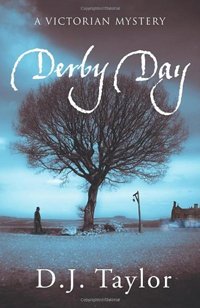 Written by DJ Taylor — David Taylor is the Norwich-based author of several award-winning autobographies, as well as two quirky and highly original crime novels featuring a down-at-heel chancer called James Ross. At The Chime Of A City Clock and Secondhand Daylight are both set in 1930s London. I loved both of those books, but was not prepared for the change of direction taken in Derby Day. This is again set mainly in London, but in the late 1860s.
Written by DJ Taylor — David Taylor is the Norwich-based author of several award-winning autobographies, as well as two quirky and highly original crime novels featuring a down-at-heel chancer called James Ross. At The Chime Of A City Clock and Secondhand Daylight are both set in 1930s London. I loved both of those books, but was not prepared for the change of direction taken in Derby Day. This is again set mainly in London, but in the late 1860s.
It is a much longer book than the two James Ross stories, and has a much broader sweep. George Happerton is a persuasive and amenable London confidence trickster with a particular interest in The Turf. His main source of income is the peculiarly Victorian practice of buying up ‘paper’ – other people’s debts – and hoping to make a profit on them. Assisted by the hapless Captain Raff, who has been cashiered for some un-named but unspeakable offence from his regiment, Happerton conspires to buy a particularly well-fancied racehorse, Tiberius, who is thought to have an outstanding chance in The Derby. The animal is owned by a delusional and debt-ridden squire, Mr Davenant, who presides over a crumbling and ghostly manor house called Scroop, in the flatlands of Lincolnshire.
Happerton’s schemes are financed by his marriage to Rebecca Gresham, a waspish and calculating young woman who lives with her ageing father in a London townhouse. Old Mr Gresham has amassed a tidy fortune through his career in equity law, but both of the newlyweds have their reasons for separating Mr Gresham from his thousands. Happerton needs other sources of income, however, and he recruits the saturnine and sinister Mr Pardew to liberate the contents of a Cornhill jeweller’s safe. Up at Scroop, Mr Davenant’s ancestral home, things go from bad to worse. Debts mount despite the apparently benign interest of Mr Happerton, and the genuine concern of Davenant’s wealthy neighbour, Mr Glenister. In the creaking, leaking and decaying house, Davenant’s damaged albino daughter Evie lives in her own strange world, despite the earnest efforts of her new governess, Miss Ellington.
As the weeks go by, and speculation, rumour and counter-rumour fly around between the racing press and the gentlemen of The Turf, the narrative goes back and forth between the seedy gentleman’s clubs and saloon bars frequented by London’s demi-monde, and the gothic gloom of Scroop, with its gamekeeper’s gibbet, the rooks clattering in the leaden sky, and Evie flitting between the trees like some ragged spectre from an MR James story. However Captain McTurk is in receipt of certain information, and is assembling his evidence so that he can pounce on the guilty parties.
This is a beautifully composed and very elegant pastiche of Victorian style. That David Taylor has written a biography of Thackeray will give the reader some clue as to the stylistic borrowings, but there are also elements of Dickens, Trollope and Hardy in the writing, as well as some very funny one-liners in the dialogue. A hard-bitten reader of contemporary crime stories might argue that, despite the book’s sub-title, there is not much actual mystery here, and that we pretty much know who the villains are from the start, but the sheer quality of the writing and the mastery of the genre persuade me to rate Derby Day with top marks. The haunting descriptions of Scroop and its beleaguered residents are as powerful as anything I have read in a long time.
Chatto & Windus
Print/Kindle
£5.22
CFL Rating: 5 Stars









The Victorian period is always interesting, especially as Britain seems to be socially heading that way again. Does the author make subliminal parallels to the present day?